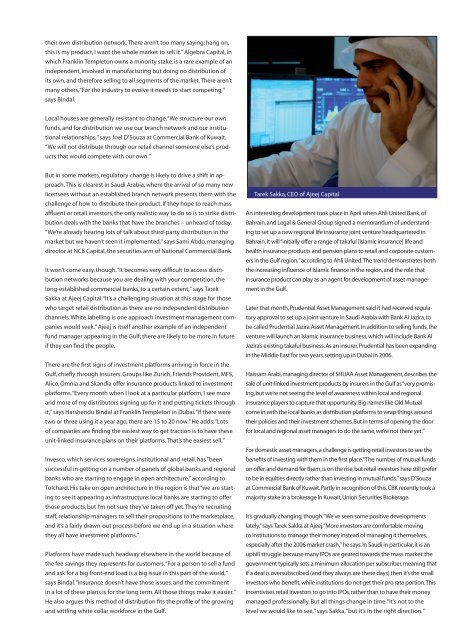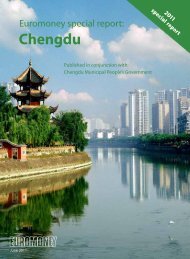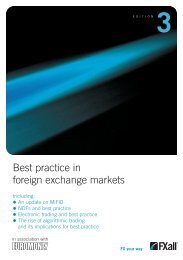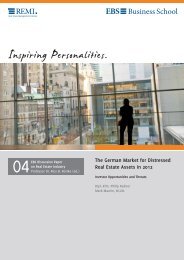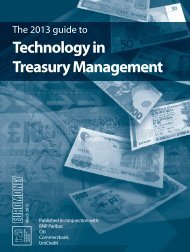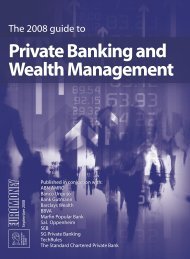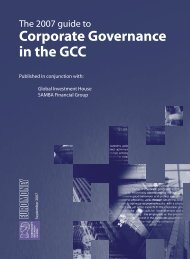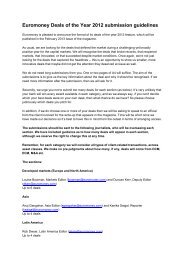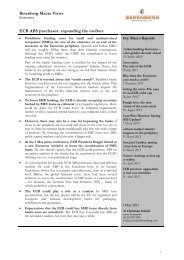Create successful ePaper yourself
Turn your PDF publications into a flip-book with our unique Google optimized e-Paper software.
<strong>the</strong>ir own distribution network. There aren’t too many say<strong>in</strong>g: hang on,this is my product, I want <strong>the</strong> whole market to sell it.” Algebra Capital, <strong>in</strong>which Frankl<strong>in</strong> Templeton owns a m<strong>in</strong>ority stake, is a rare example of an<strong>in</strong>dependent, <strong>in</strong>volved <strong>in</strong> manufactur<strong>in</strong>g but do<strong>in</strong>g no distribution ofits own, and <strong>the</strong>refore sell<strong>in</strong>g to all segments of <strong>the</strong> market. There aren’tmany o<strong>the</strong>rs. “For <strong>the</strong> <strong>in</strong>dustry to evolve it needs to start compet<strong>in</strong>g,”says B<strong>in</strong>dal.Local houses are generally resistant to change. “We structure our ownfunds, and for distribution we use our branch network and our <strong>in</strong>stitutionalrelationships,” says Joel D’Souza at Commercial Bank of Kuwait.“We will not distribute through our retail channel someone else’s productsthat would compete with our own.”But <strong>in</strong> some markets, regulatory change is likely to drive a shift <strong>in</strong> approach.This is clearest <strong>in</strong> Saudi Arabia, where <strong>the</strong> arrival of so many newlicensees without an established branch network presents <strong>the</strong>m with <strong>the</strong>challenge of how to distribute <strong>the</strong>ir product. If <strong>the</strong>y hope to reach massaffluent or retail <strong>in</strong>vestors, <strong>the</strong> only realistic way to do so is to strike distributiondeals with <strong>the</strong> banks that have <strong>the</strong> branches – unheard of today.“We’re already hear<strong>in</strong>g lots of talk about third-party distribution <strong>in</strong> <strong>the</strong>market but we haven’t seen it implemented,” says Sami Abdo, manag<strong>in</strong>gdirector at NCB Capital, <strong>the</strong> securities arm of National Commercial Bank.It won’t come easy, though. “It becomes very difficult to access distributionnetworks because you are deal<strong>in</strong>g with your competition, <strong>the</strong>long-established commercial banks, to a certa<strong>in</strong> extent,” says TarekSakka at Ajeej Capital. “It’s a challeng<strong>in</strong>g situation at this stage for thosewho target retail distribution as <strong>the</strong>re are no <strong>in</strong>dependent distributionchannels. White labell<strong>in</strong>g is one approach <strong>in</strong>vestment <strong>management</strong> companieswould seek.” Ajeej is itself ano<strong>the</strong>r example of an <strong>in</strong>dependentfund manager appear<strong>in</strong>g <strong>in</strong> <strong>the</strong> Gulf; <strong>the</strong>re are likely to be more <strong>in</strong> futureif <strong>the</strong>y can f<strong>in</strong>d <strong>the</strong> people.There are <strong>the</strong> first signs of <strong>in</strong>vestment platforms arriv<strong>in</strong>g <strong>in</strong> force <strong>in</strong> <strong>the</strong>Gulf, chiefly through <strong>in</strong>surers. Groups like Zurich, Friends Provident, MFS,Alico, Omnia and Skandia offer <strong>in</strong>surance products l<strong>in</strong>ked to <strong>in</strong>vestmentplatforms. “Every month when I look at a particular platform, I see moreand more of my distributors sign<strong>in</strong>g up for it and putt<strong>in</strong>g tickets throughit,” says Harshendu B<strong>in</strong>dal at Frankl<strong>in</strong> Templeton <strong>in</strong> Dubai. “If <strong>the</strong>re weretwo or three us<strong>in</strong>g it a year ago, <strong>the</strong>re are 15 to 20 now.” He adds: “Lotsof companies are f<strong>in</strong>d<strong>in</strong>g <strong>the</strong> easiest way to get traction is to have <strong>the</strong>seunit-l<strong>in</strong>ked <strong>in</strong>surance plans on <strong>the</strong>ir platforms. That’s <strong>the</strong> easiest sell.”Invesco, which services sovereigns, <strong>in</strong>stitutional and retail, has “beensuccessful <strong>in</strong> gett<strong>in</strong>g on a number of panels of global banks and regionalbanks who are start<strong>in</strong>g to engage <strong>in</strong> open architecture,” accord<strong>in</strong>g toTolchard. His take on open architecture <strong>in</strong> <strong>the</strong> region is that “we are start<strong>in</strong>gto see it appear<strong>in</strong>g as <strong>in</strong>frastructure: local banks are start<strong>in</strong>g to offerthose products, but I’m not sure <strong>the</strong>y’ve taken off yet. They’re recruit<strong>in</strong>gstaff, relationship managers to sell <strong>the</strong>ir propositions to <strong>the</strong> marketplace,and it’s a fairly drawn-out process before we end up <strong>in</strong> a situation where<strong>the</strong>y all have <strong>in</strong>vestment platforms.”Platforms have made such headway elsewhere <strong>in</strong> <strong>the</strong> world because of<strong>the</strong> fee sav<strong>in</strong>gs <strong>the</strong>y represents for customers. “For a person to sell a fundand ask for a big front-end load is a big issue <strong>in</strong> this part of <strong>the</strong> world,”says B<strong>in</strong>dal. “Insurance doesn’t have those issues, and <strong>the</strong> commitment<strong>in</strong> a lot of <strong>the</strong>se plans is for <strong>the</strong> long term. All those th<strong>in</strong>gs make it easier.”He also argues this method of distribution fits <strong>the</strong> profile of <strong>the</strong> grow<strong>in</strong>gand settl<strong>in</strong>g white collar workforce <strong>in</strong> <strong>the</strong> Gulf.Tarek Sakka, CEO of Ajeej CapitalAn <strong>in</strong>terest<strong>in</strong>g development took place <strong>in</strong> April when Ahli United Bank, ofBahra<strong>in</strong>, and Legal & General Group signed a memorandum of understand<strong>in</strong>gto set up a new regional life <strong>in</strong>surance jo<strong>in</strong>t venture headquartered <strong>in</strong>Bahra<strong>in</strong>. It will “<strong>in</strong>itially offer a range of takaful [Islamic <strong>in</strong>surance] life andhealth <strong>in</strong>surance products and pension plans to retail and corporate customers<strong>in</strong> <strong>the</strong> Gulf region,” accord<strong>in</strong>g to Ahli United. The trend demonstrates both<strong>the</strong> <strong>in</strong>creas<strong>in</strong>g <strong>in</strong>fluence of Islamic f<strong>in</strong>ance <strong>in</strong> <strong>the</strong> region, and <strong>the</strong> role that<strong>in</strong>surance product can play as an agent for development of asset <strong>management</strong><strong>in</strong> <strong>the</strong> Gulf.Later that month, Prudential <strong>Asset</strong> Management said it had received regulatoryapproval to set up a jo<strong>in</strong>t venture <strong>in</strong> Saudi Arabia with Bank Al Jazira, tobe called Prudential Jazira <strong>Asset</strong> Management. In addition to sell<strong>in</strong>g funds, <strong>the</strong>venture will launch an Islamic <strong>in</strong>surance bus<strong>in</strong>ess, which will <strong>in</strong>clude Bank AlJazira’s exist<strong>in</strong>g takaful bus<strong>in</strong>ess. As an <strong>in</strong>surer, Prudential has been expand<strong>in</strong>g<strong>in</strong> <strong>the</strong> Middle East for two years, sett<strong>in</strong>g up <strong>in</strong> Dubai <strong>in</strong> 2006.Haissam Arabi, manag<strong>in</strong>g director of SHUAA <strong>Asset</strong> Management, describes <strong>the</strong>sale of unit-l<strong>in</strong>ked <strong>in</strong>vestment products by <strong>in</strong>surers <strong>in</strong> <strong>the</strong> Gulf as “very promis<strong>in</strong>g,but we’re not see<strong>in</strong>g <strong>the</strong> level of awareness with<strong>in</strong> local and regional<strong>in</strong>surance players to capture that opportunity. Big names like Old Mutualcome <strong>in</strong> with <strong>the</strong> local banks as distribution platforms to wrap th<strong>in</strong>gs around<strong>the</strong>ir policies and <strong>the</strong>ir <strong>in</strong>vestment schemes. But <strong>in</strong> terms of open<strong>in</strong>g <strong>the</strong> doorfor local and regional asset managers to do <strong>the</strong> same, we’re not <strong>the</strong>re yet.”For domestic asset managers, a challenge is gett<strong>in</strong>g retail <strong>in</strong>vestors to see <strong>the</strong>benefits of <strong>in</strong>vest<strong>in</strong>g with <strong>the</strong>m <strong>in</strong> <strong>the</strong> first place. “The number of mutual fundson offer, and demand for <strong>the</strong>m, is on <strong>the</strong> rise, but retail <strong>in</strong>vestors here still preferto be <strong>in</strong> equities directly ra<strong>the</strong>r than <strong>in</strong>vest<strong>in</strong>g <strong>in</strong> mutual funds,” says D’Souzaat Commercial Bank of Kuwait. Partly <strong>in</strong> recognition of this, CBK recently took amajority stake <strong>in</strong> a brokerage <strong>in</strong> Kuwait, Union Securities Brokerage.It’s gradually chang<strong>in</strong>g, though. “We’ve seen some positive developmentslately,” says Tarek Sakka at Ajeej. “More <strong>in</strong>vestors are comfortable mov<strong>in</strong>gto <strong>in</strong>stitutions to manage <strong>the</strong>ir money <strong>in</strong>stead of manag<strong>in</strong>g it <strong>the</strong>mselves,especially after <strong>the</strong> 2006 market crash,” he says. In Saudi <strong>in</strong> particular, it is anuphill struggle because many IPOs are geared towards <strong>the</strong> mass market: <strong>the</strong>government typically sets a m<strong>in</strong>imum allocation per subscriber, mean<strong>in</strong>g thatif a deal is oversubscribed (and <strong>the</strong>y always are <strong>the</strong>se days) <strong>the</strong>n it’s <strong>the</strong> small<strong>in</strong>vestors who benefit, while <strong>in</strong>stitutions do not get <strong>the</strong>ir pro rata portion. This<strong>in</strong>centivises retail <strong>in</strong>vestors to go <strong>in</strong>to IPOs, ra<strong>the</strong>r than to have <strong>the</strong>ir moneymanaged professionally. But all th<strong>in</strong>gs change <strong>in</strong> time. “It’s not to <strong>the</strong>level we would like to see,” says Sakka, “but it’s <strong>in</strong> <strong>the</strong> right direction.”


